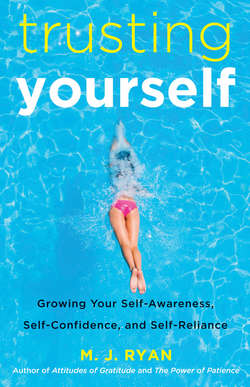Читать книгу Trusting Yourself - M. J. Ryan - Страница 16
На сайте Литреса книга снята с продажи.
Creativity and Success Flourish
ОглавлениеThere are 152 distinctly different ways of holding a baby—and all are right.
—Heywood Broun
Dick Fosbury was a high jumper. But instead of facing the pole and jumping it feetfirst, he somehow got the idea to throw his body over headfirst, with his face looking at the sky. “I was told over and over again that I would never be successful . . . that the technique would never work,” he is quoted as saying in Attitude 101. In fact, he was so criticized that the position soon got a name—the Fosbury flop. But despite the ridicule, Fosbury trusted that he was onto something. He kept at it. Then, at the Olympics in Mexico in 1968, the laughter stopped as Fosbury not only won the gold medal with his flop, but set a new world record. Today, all high jumpers use his technique.
I love this story because it is such a great example of how the new is born. Someone dares to do something different. If it succeeds, pretty soon everyone's doing it. But for the first person to stick his neck out, it's a very big deal. My friend Fuping tells me that there's a Chinese proverb that says, “The gun shoots the first bird.” No matter what culture you come from, going against the crowd can be challenging. That's where trusting yourself comes in.
You get a new idea. Because it's never been done before, the world is full of folks who will tell you that it will never work. With self-trust, you have the capacity, like Dick Fosbury, to let the naysaying slide off you, like water off the proverbial duck's back.
Without this ability, our ideas can be stillborn, and we can live a life full of regrets. I once knew a woman who had an idea to do a book about the inner workings of mechanical objects. “Wouldn't it be great,” she said, “to see how they make M&M's or understand how the electric can opener functions?” “That's ridiculous,” said her husband. “No one would want to buy that,” said her sister. She let the idea go. A few years later, David Macaulay came out with The Way Things Work, which was a massive best-seller. She's bitter about her self-betrayal to this day.
Self-trust gives us the capacity to say to ourselves, I think I'm onto something. I believe in this, even if no one else does, and I am going to take it as far as I can. With this capacity, we are able to “go where no man has gone before.” Our energies are spent on making what we want happen rather than second-guessing ourselves or warding off potential dangers. So the chances for success increase.
Consider the tale of a cabinetmaker who lost his job in 1978. Trusting himself, he teamed with a friend to start a hardware store. Today that business does $30 billion in sales—for the cabinetmaker and his friend are the founders of Home Depot.
Or consider the trust in oneself required for scientific discoveries and innovation of all sorts. Many of the world's greatest scientists—Pythagoras, Copernicus, Galileo, Newton, Darwin—had to withstand ridicule, contempt, and in some cases persecution for trusting that what they knew was accurate despite its unpopularity. But they refused to back down and were ultimately proven correct.
When we stick our neck out and succeed, we get a sense of pride that is attainable no other way. Precisely because we did it ourselves, against the odds, we feel victorious, powerful. That sense of accomplishment fuels us to trust ourselves even more, creating an upward spiral of increasingly joyful satisfaction in ourselves and our efforts.
